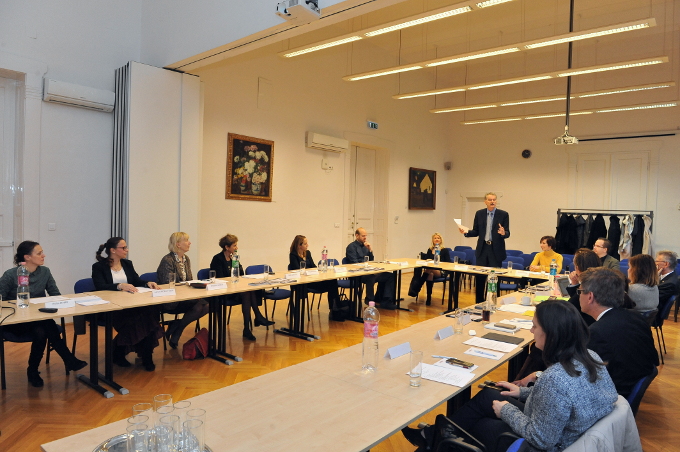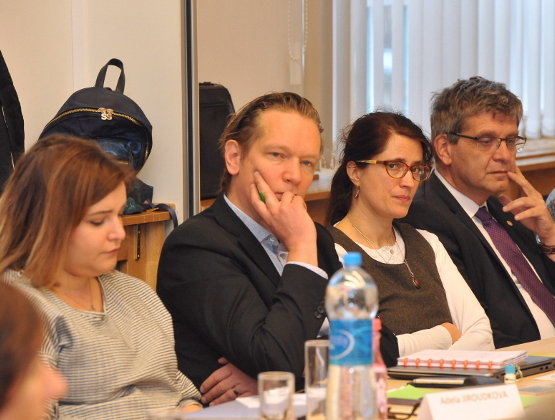News feed
“Opportunity to intensify our participation in international research projects”
2018. 01. 31.BME’s success in last year’s call for proposals by Central Europe Leuven Strategic Alliance; two research projects are among the winners.
We expect that BME’s successful participation in the CELSA projects will encourage our researchers to take advantage of further research opportunities and apply for even more calls, emphasised Krisztina László, Vice-Rector for International Relations to bme.hu, referring to the success of two BME research groups in being selected in CELSA’s 2017 call for proposals. She added: “We are proud to be able to work together with the Catholic University of Leuven (KU Leuven), which is in a prestigious 5th place in the global rankings of higher education institutions”.
|
CELSA (Central Europe Leuven Strategic Alliance), which aims at promoting research collaboration between its members, was founded in May 2016 during a series of events held at the initiative of KU Leuven in honour of the 700th anniversary of the birth of Charles IV. The strategic cooperation agreement was signed by Budapest University of Technology and Economics, Eötvös Loránd University, Semmelweis University, University of Ljubjana, Charles University, Czech Technical University and the Catholic University of Leuven, to which the University of Tartu joined in 2017 as a new member. The higher education institutions of the alliance undertook to collaborate in research and education, as well as to serve the wider community: they participate in joint educational, research and exchange programmes and work together to explore any further options for collaboration. (Editor note: bme.hu reported on our university joining CELSA.)
Photo source: CELSA |
Krisztina László explained: CELSA supports the international collaboration of its members by issuing calls for proposals for research projects every year. These projects involve the cooperation between KU Leuven and at least one of the other CELSA universities, in which the first step is to submit joint application documentation. The member universities have set up a virtual joint CELSA Research Fund (to which the Belgian university contributed with substantial financing), from which the projects of the winning research groups are funded for three years (two years of professional activities and in the third year the applicant consortium has to jointly apply for a call for proposals for a European competitive funding programme). Concerning the details she added that “BME committed to contribute to the joint fund for 3 years, paying EUR 60,000 every year. This is an earmarked sum in our university’s budget for research funding and having this format - our own research budget - is unprecedented at BME.”
The head of the Department of Research and Innovation (Rector’s Cabinet) explained that CELSA’s first call for proposals for collaborate research projects was issued in 2017. Of the more than 50 applications 7 came from BME. The Evaluation Committee, composed of scientists from the University of Leuven and the partner universities (including Katalin Bagi, professor of BME’s Faculty of Civil Engineering), assessed and ranked the entries and, in the summer, submitted its proposal to CELSA’s Board, the alliance’s governing body, comprising the member institutions’ highest-ranking representatives, which then finalised the list of winning projects. “BME was very successful, since two of our applications were included among the 10 funded projects”, Anikó Csákány said about the results.
|
One of the recipients of the CELSA funding is the research group of Péter Antal, associate professor at the Department of Measurement and Information Systems of the Faculty of Electrical Engineering and Informatics. The title of the project: Hiduction: Privacy Preserving data sharing, analysis and decision support in personalised medicine. The other winner is the research group of László Poppe, professor at the Department of Organic Chemistry and Technology at the Faculty of Chemical Technology and Biotechnology. The title of the project: Concerto for solids and biocatalysts – Cascade biocatalysis and heterogeneous catalysis for fine chemicals production (ConSolid). A brief description of the selected projects is available on CELSA’s website. |
Krisztina László added that CELSA does more than just issuing calls for proposals, evaluating applications and funding projects. The members of the organisation decided to hold quarterly half-day workshops to help applicants with their applications and provide professional assistance for future applicants. “We are proud to have been the hosts of the first such event here at BME, which was organised in mid-November.
|
The aim of the CELSA Round Table Discussion, held at BME at the end of 2017, was to explore how member universities could help applicants to describe the practical benefits of their research results in a clearly understandable way while focusing on the potential for social impact and utilisation. It was announced at the event that the University of Leuven was a forerunner of this, since they have been organising such seminars for a while now, with interactive exercises, examples and group situations, thus assisting future applicants in mastering the new approach. BME was represented by Rector János Józsa, Vice-Rector for International Affairs Krisztina László, Director of Research and Innovation Anikó Csákány and Viktória Feigl, assistant professor of the Department of Applied Biotechnology and Food Science at the Faculty of Chemical Technology and Biotechnology. The keynote speaker of the event was Szonja Csuzdi, Head of Department at the National Research, Development and Innovation Office, after which the delegates of the partner universities shared their examples for successful social communication, enabling knowledge sharing between the participants. A rendezvényen Csuzdi Szonja, a Nemzeti Kutatási Fejlesztési és Innovációs Hivatal főosztályvezetője tartott bevezető előadást, majd a partneregyetemek delegáltjai olyan példákat osztottak meg a közönséggel, amelyeknél a társadalmi kommunikáció jól sikerült, így a résztvevők tanulhattak egymástól. |
Professor Krisztina László pointed out that CELSA’s 2018 call for proposals for collaborative research projects had already been published and also included the expected scheduling. Key information for potential applicants from BME will be published shortly on one of the subpages of BME’s website, she added.
| Publication of the call for proposals | November 2017 |
| Publication of criteria for accepting applications by BME | 1 February 2018 |
| Submission of preliminary project proposals to be approved by BME | 15 February 2018 |
| Deadline for submitting project proposals (on KU Leuven’s site) | 1 March 2018 |
| Evaluation of project proposals | March-June 2018 |
| Decision (CELSA Board) | June 2018 |
| Announcement of the results | July-August 2018 |
| Start of the projects | 1 October 2018 |
-GI-
Photo: János Philip






